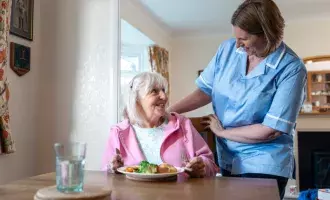Local government exists to serve local people, businesses and those who visit, either to work or for recreation. I, and thousands of my Capita colleagues support over 250 councils up and down the county to deliver better and more efficient services by bringing together great people with the latest technology.
We run IT systems and managed services, and physical and digital infrastructure. We have the largest team of town planners in the country, helping places develop into communities. We help collect revenue, distribute benefits and grants. We help citizens to get the local services they need.
During the pandemic, along with every other business, we have had to find new ways to deliver our services and help our customers do the same. Everything from the UK’s first virtual swearing in ceremony to distributing £500m of business grants.
Technology has been a great enabler that has accelerated digital transformation and modernisation across the UK. I believe this presents a great opportunity for local Government to create better outcomes for citizens.
I recently spoke about this great opportunity at the Society for Innovation, Technology and Modernisation Presidents conference. I outlined some of our own research which highlights some of the opportunities and challenges that lie ahead.
Continuing the momentum of change
We spoke to over 50 council senior managers and leaders and it was unsurprising that most said their council had been negatively impacted by the pandemic. Yet, it was good to see that 86% rated the adoption of new technologies as ‘good’ or ‘very good’. More surprising though was that 44% believed that they could sustain this rate of change; some even said it could be accelerated.
Separately we asked CEOs and senior officers what their priority issues were. We found that funding is naturally a key concern, as demand is still rising, but revenue is down. However, the fact that data was prioritised above homes, economic recovery and social care was initially surprising until you start to delve into the why.
Delving into data
We asked 20 council chief finance officers (CFOs) and Section 151 officers about data, and most responded that it is still being used in pockets across their council or drawn together for specific project. No one believed data was being used effectively to underpin decisions and provide insight into transformation.
Yet, 67% also indicated that transformation was the key priority in the long-term, so it’s clear that we have some way to go.
There are obvious advantages for councils if they transform the way they manage data and prioritise technological change. However, rather than focus on how to modernise and transform, I believe we need to take a step back and think about the why and who.
To create better outcomes for citizens through modernisation, we need to do three things:
- focus on citizens
- acknowledge that digital transformation is much more than technology
- ensure that progress is personal.
Focusing on citizens means understanding how their behaviours are changing and not making assumptions based on patterns of behaviour. We have worked with several councils and their citizens to co-design new service delivery models and supporting technology. By doing this, we have discovered ways to reduce non-completion of processes with the repositioning of a button, created natural language voice automation for those that still prefer to speak to the council and added more modern channels like WhatsApp that allow a wider range of people to access services. Done well, co-design can create ambassadors and give other citizens some assurance that the solution is both easy to use and effective.
Digital transformation needs purpose, process, people and passion
If councils embark on digital transformation without a clear purpose, they will lack the signposts along the journey to help them to make coherent choices as circumstances inevitably change.
Transformation must also include a rethink of the underlying process. A conversion of a bad analogue system into a digital one won’t make it any better.
We must also be ready to transform systems at a quite basic level. Take some steps outside the box and even council boundaries. For example, the Scottish Wide Area Network provides 90 organisations, including 50% of the country’s local authorities, with access to a unified network and applications - providing savings of £30m. But the real value has been to its users. One network means healthcare workers no longer need to carry around two laptops. Data about patients is more easily shared securely and multi-agency responses are more joined-up.
For transformation to deliver over a period of time, mindsets and attitudes also have to change and you need the right people to do this. The pandemic has helped to boost acceptance of digital, but there are still areas of misunderstanding that could limit the positive impacts of change, such as automation and AI.
Digital transformation must also be felt; it needs passion in its delivery. We see this more often where transformation is accompanied by a move to high performance cultures.
Progress must be personal. Where we have worked with authorities to improve the revenues and benefits process, we considered how we can make it as easy as possible for citizens and officers. What channels should be included? What data do we need to draw together to resolve a query in one interaction? How do we help officers spend time on the complex cases? What can be automated to allow better access and speedier resolution?
Progress that’s personal must also be inclusive. There are still far too many people out there in our communities having to make choices about buying data to apply for jobs online or buy food. If transformations exclude certain groups or individuals, we miss the opportunity to deliver better outcomes.
Converting successful crisis operations into a sustainable model for the future
Councils have proven that they can deliver in difficult circumstances through sustained periods of uncertainty and disruption. Ensuring bins are collected and protecting the vulnerable while also successfully deploying local contact tracing, grants to businesses and providing much needed clear communication to our communities. This should be celebrated.
To convert these successful crisis operations into a sustainable model for the future we are going to have to be innovative and take some risks to avoid a slide back into what might quickly become a mire of unmet demand.
We need to make local Government more productive to create the right environment for people to succeed and thrive. This allows local businesses to keep money in the local economy and attract additional investment.
This doesn’t mean officers having to work harder. In fact, I would advocate the opposite. If the hallmarks of good service are efficiency, cost effectiveness and care – I would say we need to free up officers to do the caring while technology takes up the strain when it comes to efficient and cost-effective services.
Most citizens would be happy with a single council app that lets them query, transact and resolve in a simple, single journey – with the option to talk to a human being when its complicated.
Businesses want to be able to get support, apply for grants and deal with rates as quickly and easily as possible. Councils have been presented with a great opportunity, now is the time to seize it.
We're providing services and solutions that improve outcomes and save money, so councils can focus on what matters in their communities.








